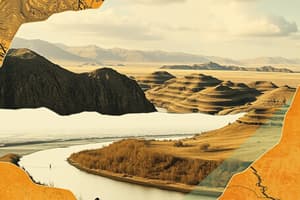Podcast
Questions and Answers
How do cultural geographers view landscapes?
How do cultural geographers view landscapes?
- As a blank canvas waiting to be filled
- As a reflection of cultural identity and history (correct)
- As temporary features that change constantly
- As purely physical entities with no cultural significance
What is cultural geography concerned with?
What is cultural geography concerned with?
- Studying the anatomy of different animal species
- Investigating astronomical phenomena in various cultures
- Exploring how people shape and are shaped by their environments (correct)
- Analyzing chemical compositions of different landscapes
What do place names reveal according to the text?
What do place names reveal according to the text?
- The social dynamics and cultural heritage of a region (correct)
- The economic status of a place
- The political leaders of a country
- A region's weather patterns
In what ways are places embedded with power according to geographers?
In what ways are places embedded with power according to geographers?
How does cultural geography interpret human life and expression?
How does cultural geography interpret human life and expression?
What is the main focus of cultural geography?
What is the main focus of cultural geography?
How do cultural geographers contribute to understanding global phenomena?
How do cultural geographers contribute to understanding global phenomena?
In cultural geography, what do cultural performances refer to?
In cultural geography, what do cultural performances refer to?
What does cultural geography teach us about landscapes?
What does cultural geography teach us about landscapes?
Why is it important to learn to read landscapes in cultural geography?
Why is it important to learn to read landscapes in cultural geography?
Flashcards are hidden until you start studying
Study Notes
Uncovering Cultural Geography: The Art of Understanding Place Through People
Cultural geography is the captivating field that explores how people shape and are shaped by their environments. It's a lens through which we interpret the rich tapestry of human life and expression, tracing the lines where physical landscapes, social practices, and cultural traditions intersect.
Cultural Landscapes
Cultural geographers scrutinize landscapes for clues about the people who inhabit them. A landscape can be both a tangible and intangible expression of culture, and it tells a story of the past, present, and future. From the magnificent architecture of ancient Mayan temples to the vast maze-like favelas of Rio de Janeiro, each place holds a unique cultural identity and history.
The Language of Place
Just as languages convey meaning, so too do place names. A geographer might analyze the origin, evolution, and significance of place names to reveal a region's history, cultural heritage, and social dynamics. For example, the names of many cities and towns in Europe have been drawn from ancient mythology, while place names in English often reflect the Anglo-Saxon influence.
The Power of Place
Geographers investigate how places are embedded with power, privilege, and marginalization, often serving as a microcosm of society's stratification. For instance, the socioeconomic status of a neighborhood might be visible in its infrastructure, architecture, and the presence of public amenities.
Geographies of Difference
Cultural geography celebrates human diversity, examining how people inhabit space in distinct ways. From the colorful markets of Marrakech to the bustling nightlife of Tokyo, these geographies of difference reveal a world of rich cultural expression.
Cultural Flows and Connections
Cultural geographers study the ways that culture moves across space and time, examining the processes and forces that shape the transmission of ideas, people, and goods. They explore how interactions between cultures give rise to global phenomena, from the rise of world religions to the emergence of new forms of music, art, and fashion.
Cultural Performances
Cultural geographers scrutinize the performances of culture, examining how people express their identities and beliefs through various mediums such as music, dance, and theater. For example, one could analyze how the Rio Carnival reflects Brazilian culture or how the traditional dance of Kathakali in India embodies local beliefs and values.
The Art of Reading Landscapes
Ultimately, cultural geography is about learning to read landscapes, to discern the stories they tell, and to understand the people they represent. It's about looking beyond the superficial to discover the deeper layers of human experience. From ancient civilizations to modern metropolises, each place holds a unique cultural narrative, waiting to be discovered.
Studying That Suits You
Use AI to generate personalized quizzes and flashcards to suit your learning preferences.




